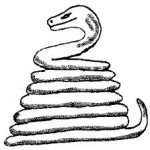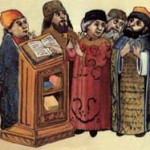Musings from Students of the Pardes Institute of Jewish Studies in Jerusalem
Posted on February 26, 2014 by Naomi Bilmes
From my blog:
 What is the purpose of a story? To be re-written, of course! Below, I have composed a re-telling of one of the most famous stories in Jewish tradition. It is originally found in the Babylonian Talmud (Tractate Bava Metzia, page 59), and I recently learned it from a new angle with one of my teachers at Pardes. My re-telling, in the style of folktale, is inspired by the new eyes through which I now view the story. Enjoy the ambiguity!
What is the purpose of a story? To be re-written, of course! Below, I have composed a re-telling of one of the most famous stories in Jewish tradition. It is originally found in the Babylonian Talmud (Tractate Bava Metzia, page 59), and I recently learned it from a new angle with one of my teachers at Pardes. My re-telling, in the style of folktale, is inspired by the new eyes through which I now view the story. Enjoy the ambiguity!
Once upon a time, there was an oven.
This oven was made of slats.
In between the slats was soft sand that held the slats together.
This oven belonged to a man named Akhnai.
Some say, however, that his name wasn’t Akhnai; rather, that there was no man at all. Some say that akhnai means “snake” and that the oven of akhnai was actually an oven with a snake wrapped around it.
 These people would say that the oven was the oven of a serpent. The oven of temptation. The oven of knowledge of good and evil.
These people would say that the oven was the oven of a serpent. The oven of temptation. The oven of knowledge of good and evil.
There was another disagreement regarding this oven (because it was built with sand): was it a complete vessel and therefore subject to impurity, or was it merely a pile of rubble and therefore always pure?
The majority thought the oven was subject to impurity.
One man thought the oven was always pure.
That one man was right.
And God made sure everyone knew it.
 When the man said, “If I am right, let the carob tree prove it,” the carob tree uprooted itself and moved.
When the man said, “If I am right, let the carob tree prove it,” the carob tree uprooted itself and moved.
When the man said, “If I am right, let the stream prove it,” the water in the stream flowed backward.
When the man said, “If I am right, let the walls prove it,” the walls started to cave in.
When the man said, “If I am right, let the Heavens prove it,” a Heavenly voice called out, “The man is right! And not just in this matter, but in every matter!”
And the majority heard.
And the majority disagreed.
And the majority said, “There is no law in Heaven. We make the laws down here.”
And the man was sent away.
And the oven was deemed whole. And any bread baked in that oven was fresh and aromatic and tangy and sweet. But when the majority ate the bread, they ate it in a room where the walls were still partially caved in.
There was always the fear that the walls would crumble, crushing them all, and that the snake in the pipes would come slithering out.
Because the majority had been tempted. They had seen an oven wrapped in a snake and called it whole. They used that oven. And when they used that oven, they accepted the snake that came along with it.
Because who would pass up the chance to take an oven and use it to make perfectly good bread?
 The majority took the law for itself.
The majority took the law for itself.
The majority took ownership of all the ideas within the law.
The majority grasped the law and shaped it and molded it and held onto it for all time.
The majority did all these things out of love. Love for the law and love for God.
And God watched.
Was God angry? Did God want to keep the law for himself? Did God want to rule for all time and strike down those who disagreed with him?
Or did God want us to take the law? Did God want us to own it? Did God want us to be responsible for it? Did God want us to change it?
We will never know.
But maybe the snake does.
In the Talmud, the story continues. (There is also no bread in the Talmud; I added that literary element.) The man, Rabbi Eliezer ben Hyrcanus, is excommunicated. The rabbi who orders the excommunication dies on account of this order. The decision to exile the rabbi whom God supported haunts the rabbis for a long while after.
But God seems to accept that the law no longer belongs with him. An Aramaic insertion in the text gives an image of God smiling and saying “My sons have defeated me, my sons have defeated me!” as if it was meant to happen all along.
It seems that God stepped away. God gave the law over to us and tied his hands behind his metaphorical back. In return, we get a mixed bag: We get to decide. We get to legislate. We get the authority to change what is wrong and substantiate what is right. But we also receive responsibility. We receive the onus of making decisions for the masses. We get the uneasy feeling of never really knowing what God wanted us to do. We might be straying from God’s intention and we will never know. Because God is in the heavens, and Torah is not. Torah is down here, and we are down here, and God is up above. Our religion is a religion of man. It once belonged to God, and now it belongs to us.
So we must ask:
If it still belonged to God, would we even want it?
If it still belonged to God, would we be able to understand it?
What good is religion if it does not belong to the people?
Or, one could ask, what good is religion if its manifestation may not be what God intended?
There are two sides (at least) to every story.
Pick your side.
Re-tell the story.